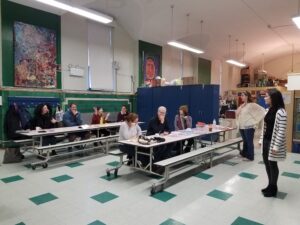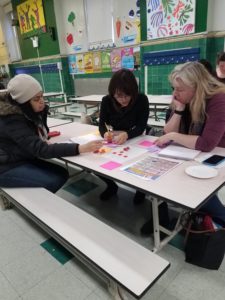They began the talk by addressing the myth of some people having a math-brain, or that only certain types of brains can be good at math. We are all capable of learning math skills, but we need to be taught in a creative, hands-on, approachable style. Believing that you are bad at math can actually block the ability to learn math and encourages giving up instead of continuing to try. Having a growth mindset, that brains are very flexible and that they can learn anything, helps people realize that while they might not be good at math yet, they can learn and master new skills. Learning is hard work, and no one is born knowing math, but we can all get better when we creatively tackle challenging new ideas. Modern math teaching is changing to include ideas about how brains work from research, including finger visualization in counting and early math as well as number sense skills.Some strategies to help solve math problems creatively
The talk was full of fun and interesting games and exercises that gave parents a good idea about how math lessons and practice can be much more interesting than we remember from our childhoods. Our school is working with these two math coaches for teacher training on how to adapt lessons with this modern view of how to best help students learn. Beth and Arielle shared resources including apps, websites, and games that parents can use to extend math learning and practice outside the classroom.
Some websites they recommended are …
- Math Learning Center – http://www.mathlearningcenter.
org/. Wealth of activities, resources, lesson plans, and virtual manipulatives. - Math For Love – http://mathforlove.com/. Seattle-based non-profit that focuses on teaching math in fun, engaging, visually, and meaningfully.
- Illustrative Mathematics – https://www.
illustrativemathematics.org/. A website full of math problems and “assessments.” Problems are arranged by grade, content standard, practice standards, and by domains. - You Cubed – https://www.youcubed.org/. Organization out of Stanford University that applies growth mindset and conceptual learning to math.
- Dan Meyer’s Website – http://blog.mrmeyer.com/. Dan Meyer’s blog and website with great reflections on math teaching and activity ideas. Click on the link on the right column “3-Act Math” to get access to his library of 3-Act Math Problems
- Estimation 180 – http://www.estimation180.com/. Series of videos and images to incorporate daily estimation that build students’ number sense skills.
- Visual Patterns – http://www.visualpatterns.org/
. 200 visual patterns from pre-school to college to engage students in a variety of thinking. - Problem Based-Learning Curriculum Maps – https://emergentmath.com/my-
problem-based-curriculum-maps/ . A blogger compiled problems into a sequence aligned to the Common Core for grades K-8 - E is for Explore – http://eisforexplore.blogspot.
com/. A compilation of blogs with creative activities for different subjects
- Quick Math JR. : Gives children the experiences with numbers they need to develop a strong number sense. Keeps data and connects to common core standards.
- Polyup : Gives children the experiences with numbers they need to develop a strong number sense. Has lesson plans attached for different skills.
- 10 Frame Fill: Gives children practice with base ten recognition.
- Math Learning Center : Apps for different skills children might be working on.
- Tens Frame Snap: Helps develop subitizing skills for number sense.
- AdaptedMind: 1-6 grade skills addressed. Taught using monsters & fun activities. If a student gets something wrong, there’s a “teacher” that explains how to solve. $9.95 a month (1st month free)
Place Value Safari Mancala
Blokus Yahtzee
Guess Who (great for logical thinking) Mastermind

 .
. 